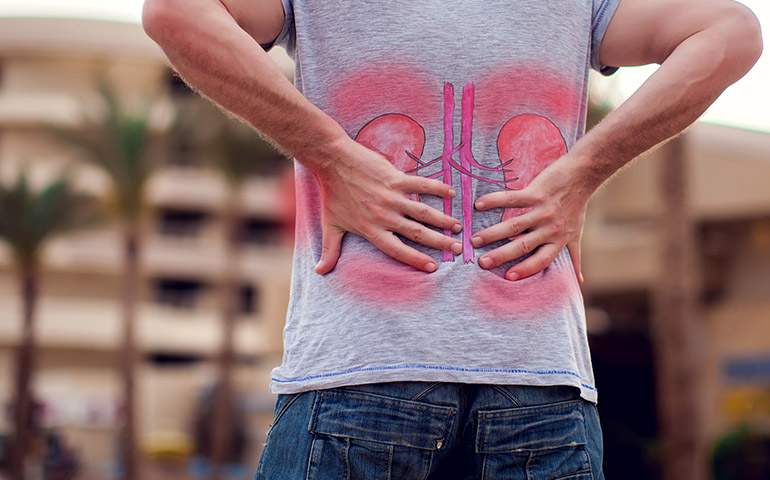यदि आपको कभी भी लगे की आपके पेशाब का रंग लाल है तो इससे बिलकुल भी नज़र-अंदाज़ न करे | लाल रंग के पेशाब आने का मतलब है पेशाब के साथ खून का आना | पेशाब में खून का आना एक ऐसी स्थिति है जो हर वर्ग लिंगों के बच्चों और वयस्कों को हो सकती है | अच्छी बात तो यह है की पेशाब में खून आने का सबसे आम कारण है पेशाब रस्ते का संक्रमित हो जाना, जिसका डॉक्टर द्वारा आसानी से इलाज किया जा सकता है |
लेकिन फिर भी आपके पेशाब में खून का आना आमतौर पर सामान्य नहीं माना जाता है और इसके साथ ही कभी-कभी रक्तयुक्त पेशाब का होना एक गंभीर बीमारी का संकेत हो सकता है | इसलिए जितना जल्दी हो सके उतना जल्दी स्वास्थ्य सेवा प्रदाता के पास जाकर इस समस्या का इलाज करवाएं, खासकर तब जब पेशाब करने में कठिनाई या फिर दर्द का सामना करना पड़ रहा हो | सही समय में इलाज मिलने आप इस समस्या से जल्द ही छुटकारा पा सकते है |
जानिए पेशाब में खून का कैसे पता करें ?
सामान्य पेशाब का रंग हलके से माध्यम से पीला या फिर साफ़ भी हो सकता है | यदि आपके पशब का रंग गुलाबी, लाल या फिर जंग लगे भूरे रंग का है तो इसका मतलब यह है की आपके पेशाब के साथ खून आ रहा है | लेकिन इस बात का भी ध्यान रखें की केवल खून ही आपके पेशाब के रंग बदलने का कारण नहीं होता है, चकुंदर और रबर्ब जैसे खाद्य पदार्थ में पाए जाने वाले प्रकृतिक और कृत्रिम रंग और फेनाज़ोपाइरिडीन जैसी दवाएं से पेशाब का रंग लाल, नारंगी और गुलाबी हो सकता है | इसके आलावा यह भी संभव हो सकता है की आपके पेशाब में खून हो और आप देख ही नहीं सकते |
पेशाब में खून आने की मुख्य वजह क्या है ?
महिलाओं और अन्य लोगों को मासिक धर्म चक्र के दौरान शौचालय में खून का आना बेहद आम बात होता है | हालांकि मासिक धर्म के दौरान शौचालय खुनी पेशाब की तरह लग सकती है, लेकिन यह समस्या वैसा नहीं होता है | यदि आपके भी पेशाब के साथ खून आ रहा है तो इस अर्थ यह हो सकता है की आपके शरीर के अंदर से कहीं खून बह रहा हो | खुनी पेशाब का होना संक्रमण या फिर चिकित्सा स्थितियों के होने का भी लक्षण हो सकता है, जो आपके गुर्दे, मूत्राशय, प्रजनन अंगों या फिर रक्त को काफी प्रभावित कर सकती है | कुछ गतिविधियां ऐसी भी होती है,जिसकी वजह से खुनी पेशाब हो सकता है |
इस समस्या से राहत कैसे पाएं ?
कभी-कभी खुनी पेशाब जैसी समस्या को ठीक होने के लिए थोड़े समय की ज़रूरत होती है | उदाहरण के लिए बात करे तो यदि रक्तस्राव तीव्र व्यायाम के कारण हो रहा है तो यह आमतौर पर कुछ ही दिनों में अपने आप ठीक भो हो सकता है | लेकिन यदि यह समस्या किसी मेडिकल स्थितियों के कारण हो रहा है तो इसके लिए बेहतर है की आप अच्छे स्वास्थ्य सेवा प्रदाता के पास जाकर इसका इलाज करवाएं |
इसके लिए आप आरजी स्टोन यूरोलॉजी एंड लेप्रोस्कोपी हॉस्पिटल से परामर्श कर सकते है | इस संस्था के सीनियर कंसलटेंट डॉक्टर पुनीत बंसल यूरोलॉजिस्ट में स्पेशलिस्ट है, जो इस समस्या से छुटकारा दिलाने में आपकी मदद कर सकते है |




